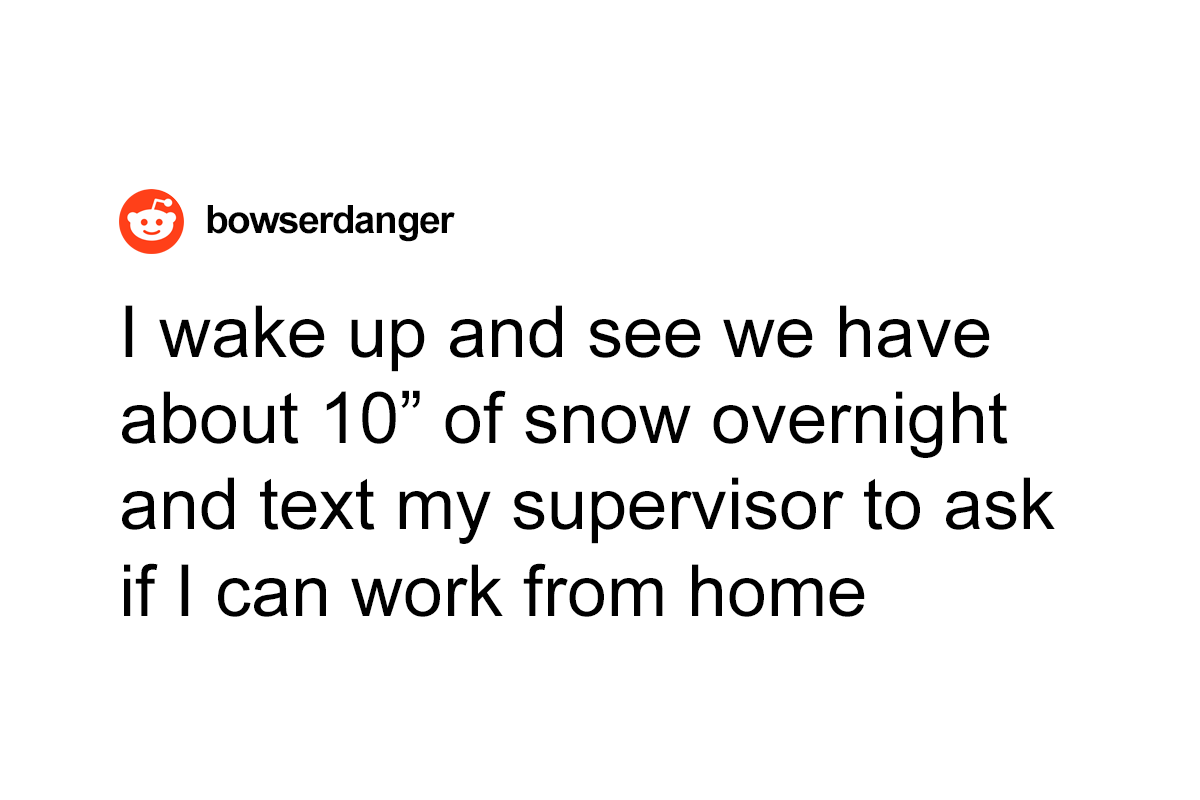
Boss Tells Employee They Can’t Work From Home, Regrets It When They Use It To Their Advantage
We all know that depending on the job sector, many employees are perfectly capable of working from home. In fact, the BBC points out that remote working can boost productivity. Meanwhile, hybrid work systems boost staff satisfaction while helping companies save on office space. However, some bosses and managers are adamantly against giving their employees more flexibility.
And this is an attitude that exists now when countless people did their jobs remotely well during the lockdowns. Imagine how hard it was to get approval to work from home before the pandemic. Well, redditor u/bowserdanger shared how their supervisor tried to get them into the office (or, well, the power plant) during a snowstorm in a viral post on r/MaliciousCompliance. Their supervisor was unwilling to listen despite the employee being perfectly capable of doing the exact same job remotely, except without the commute.
The employee wasn’t having any of that nonsense, however, and used the supervisor’s own rules and the company’s policy to come out on top. You’ll find the full story below, Pandas. When you’re done reading it all, share your opinions in the comments. And we’d love to hear what your supervisors think of WFH culture as a whole, too!
Bored Panda reached out to Eddy Ng, the Smith Professor of Equity & Inclusion in Business at Queen’s University, and he was kind enough to share some of his thoughts about WFH culture, its advantages, and why there’s such a resistance to the so-called ‘great return’ to offices that some employers want. You’ll find Professor Ng’s thoughts as you scroll down.
A redditor shared how they used their supervisor’s own rules against them when they wouldn’t let them work from home during a snowstorm
Image credits: Glenn Carstens-Peters (not the actual photo)
Here’s the story in full
Image credits: Hugo Clément (not the actual photo)
Image credits: Jan Antonin Kolar (not the actual photo)
According to Professor Ng, employers have been laying plans for the ‘great return’ to the offices. However, this process has been slower than some employers expected. The professor explained the source of this resistance to go back to the office.
“The anxiety with Covid remains high. One Toronto office had planned a return (and they did), but management reportedly sent everyone home to remote work after a number of employees tested positive. This is also exacerbated by multiple generation households where there are elderly family members,” he explained that people are understandably afraid of infecting vulnerable family members. In the professor’s opinion, the pandemic isn’t yet under control and it’s still early to talk about the post-pandemic world. “Covid-related anxiety and stress levels remain high with evolving variants.”
Meanwhile, the push to get back into offices is causing a headache for employees who want to balance work and family. “There are fewer support and hired help available as the pandemic wears on,” Professor Ng stressed that there are practical matters to consider. For example, there are simply fewer child or daycare spots available due to restrictions and a shortage of workers.
“You see reports of fewer parents with very young children indicating an eagerness or willingness to return in person,” he said. Then there’s the added cost to consider for workers who would have to commute, park their vehicles, buy more expensive food in the city, pay more for clothes, and find daycares for their children. This eats into workers’ wages and savings. And the professor isn’t the only one who sees this. The BBC recently published a striking analysis of just how expensive it is to return to the office. It is jaw-dropping how much employees save when working from home.
Professor Ng pointed out that there’s not much motivation for employees to return to offices full-time. “Most employees are settled into their pandemic work arrangements—completely remote or hybrid—with little reported loss in productivity. People are simply not eager to return to a routine that requires more effort to get to work,” he said.
The expert stressed that it’ll take a lot more than just asking nicely to get employees back in the office. “Employers are increasingly being asked to offer (both financial or procure) support to bring employees back to the office: Daycare, transport or shuttle services, meals, added ‘cost of working’ compensation, and a safe workplace,” he said that the return rate of employees will be slow, unless Covid is entirely under control.
Finally, Professor Ng said that taking away pandemic-era work arrangements from employees will likely lead to a decline in overall morale.
Redditor u/bowserdanger’s story got 13.2k upvotes and inspired folks from all around the site to share their own similar stories. As it turns out, whether or not employees are given extra flexibility at work depends a lot on their managers’ character: whether they put their workers’ job satisfaction first, trust their team, and are willing to be more flexible themselves (so long as the job gets done).
During a previous in-depth interview, Bored Panda spoke about working from home, why some bosses resist it, and the pros and cons of WFH culture with workplace expert Lynn Taylor.
“For some companies, industries, and positions, employees do need to be on site. But for those where it won’t affect their work product, managers must be open-minded about offering the flexibility and freedom of working from home. That is if they want to attract and retain the most qualified people,” Lynn, the author of ‘Tame Your Terrible Office Tyrant’ and the head of the fashion brand ‘Behind the Buckle,’ explained.
“One of the reasons some managers are opposed to work from home policies, for example, is they feel there is a lack of productivity when you can’t meet face-to-face. They believe that project teams are less effective when working offsite,” she detailed how some managers think.
“Managers may feel their own results and successes are negatively impacted because they can’t interface personally with their staff; brainstorm as easily, or react to unexpected issues on the spot. They may also feel they can’t train their employees properly when they’re offsite. For others, it’s simply resistance to change. If they’re much more traditional in their management approach, they may want to exert maximum control over their staff and be assured everyone is committed. The fear of ‘out of sight, out of mind’ looms large.”
According to workplace expert Lynn, the main benefits of working from home include: “Employees have had a taste of remote work and for many, it’s hard to go back to a traditional work environment. This has been underscored by the Great Resignation. Employees have seen productivity benefits; better focus; no commute time; and less on-site politics and gossip.
That’s not to mention the fact that they can better attend to family and personal matters. This greater work-life balance and flexibility is a major stress reducer—and for many, is even worth a pay cut, if not a job change.”
Here’s how some redditors reacted to the OP’s story. Some of them shared their bosses’ perspectives towards WFH
Meanwhile, here are some of the downsides that she sees to working remotely as well: “Some managers do need their employees on-site, especially those where required face to face interaction with customers or other employees is necessary. In addition, when everything is left to offsite work, there is a loss of spontaneity and the human bond that occurs when you’re physically visible. And a larger human need is to build something impactful together, as a team or ‘community.” She added that, in some cases, employees can feel isolated or even depressed when they’re not part of this community.
“Further, more junior employees don’t get the benefit of observing mentors and managers in action, or solving spur-of-the-moment problems real-time. There is much more to advancing in your career than interfacing with people on a screen. Social skills, diplomacy and other lifelong emotional intelligence abilities are likely being adversely affected for those in the early stages of their career,” Lynn told us.
“All that said, this new work paradigm has revealed just how much can be accomplished digitally, much to the surprise of those at every level. It also demonstrates that much of what corporate America thought was a necessity, is no longer. Many companies are happy to reduce their real estate expenses, as well.”
She continued: “The remote work revolution is putting productivity under a microscope. A digital relationship removes virtually all personal aspects good or bad. It removes downtime from a traditional work environment, such as water cooler chit-chat. But some could argue it also removes camaraderie.”
According to Lynn, hybrid systems of work might be a great compromise: managers get to see their employees in the office, meanwhile, the workers themselves are given quite a bit of freedom and flexibility.
“Whether it’s a hybrid environment or working from home, employees will need to make an extra effort to communicate often with their managers—and regularly keep them apprised of project status. This is not just good business, it protects job security and means better results,” Lynn said, adding that the best way to secure your job is to be very good at it.
“The downsides of remote work can be mitigated with a hybrid work environment. This allows the best of both worlds. And it appears more advantageous than, say, a four-day workweek, which can result in people working later hours or overtime, regardless. If they end up working on a fifth day to keep pace, it defeats the purpose, such as when clients or vendors need to reach them on that extra day,” she said.
The expert warned that things might change radically in the future. “When the pendulum swings back to the employer, such as when employment skyrockets in the future and landing a job is more difficult, the situation may change. Employees may feel compelled to have greater face time in the office to preserve their coveted jobs,” she said, thinking about how the job market might change later on.
“Regardless of the state of the economy, the work from home landscape is creating more project workers and consultants. Because of the positive experience working from home, many have now shifted to independent work, especially when employers have insisted they return full-time. Employers may lose valued talent to this alternate option by not offering the flexibility of remote work,” Lynn told Bored Panda.
“Of course, any employee that abuses the privilege of working offsite won’t remain long-term at any company,” she stressed that WFH systems work only as long as the employees are honest and hard-working.
The reason corporate America wants you back in the office is because their office buildings are worthless and no longer assets on the balance sheet if they are not being used... nor are they of value to anyone else so they cannot be rented or sold.
Not always. I work at a University so we're using all that space for faculty and students anyway. Office staff where I work in IT still need to come in. I'm absolutely convinced it's because the IT director wants to monitor our internet traffic. I know he does even though he's not supposed to. His hardline on "no (more) WFH" has and will continue to cost us talent, among other things. (I work part time for mental health reasons and would increase my work hours if I could decrease my commute time, but no-can-do! Even though the University has a WFH policy that he's not supposed to be blanket denying. It makes me so frustrated.)
Load More Replies...It's always hilarious when a boss or someone above them will pull the whole "the roads aren't that bad" line. Look, mother nature is funny as it is. I've gotten two feet of snow at my house and then go five miles town the road and there not be a flake on the ground. Slipped down my steps after some ice once. Called my employer at the time to inform them I couldn't come in. "Oh the roads are bad where you live?"
The last FT job I had, we had to stay overnight if there was a blizzard the next day because in TV, the show must go on.
Load More Replies...The reason corporate America wants you back in the office is because their office buildings are worthless and no longer assets on the balance sheet if they are not being used... nor are they of value to anyone else so they cannot be rented or sold.
Not always. I work at a University so we're using all that space for faculty and students anyway. Office staff where I work in IT still need to come in. I'm absolutely convinced it's because the IT director wants to monitor our internet traffic. I know he does even though he's not supposed to. His hardline on "no (more) WFH" has and will continue to cost us talent, among other things. (I work part time for mental health reasons and would increase my work hours if I could decrease my commute time, but no-can-do! Even though the University has a WFH policy that he's not supposed to be blanket denying. It makes me so frustrated.)
Load More Replies...It's always hilarious when a boss or someone above them will pull the whole "the roads aren't that bad" line. Look, mother nature is funny as it is. I've gotten two feet of snow at my house and then go five miles town the road and there not be a flake on the ground. Slipped down my steps after some ice once. Called my employer at the time to inform them I couldn't come in. "Oh the roads are bad where you live?"
The last FT job I had, we had to stay overnight if there was a blizzard the next day because in TV, the show must go on.
Load More Replies...

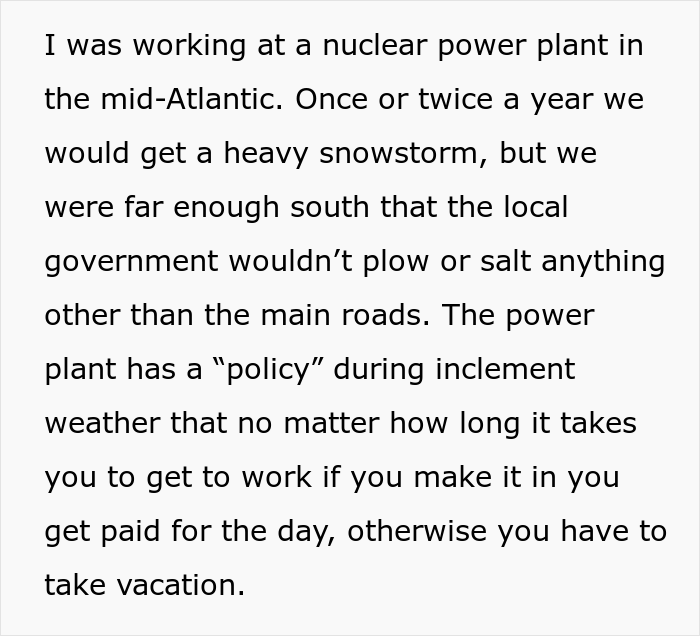
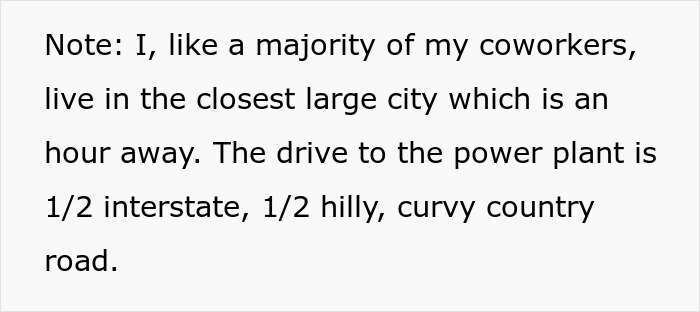

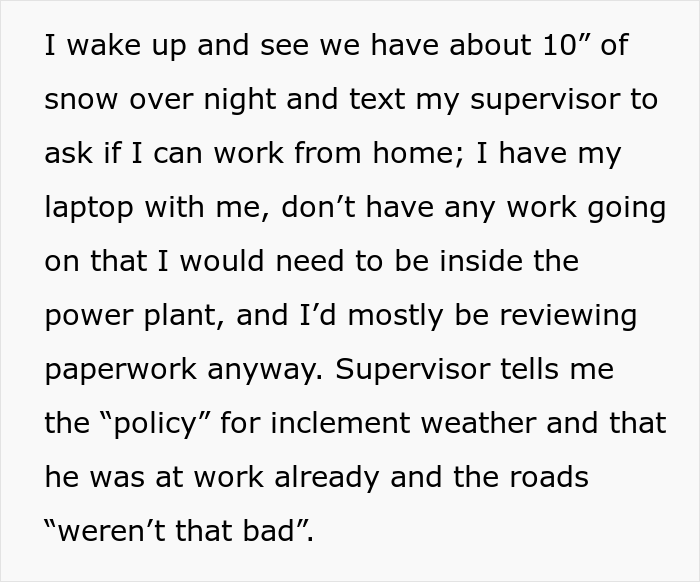
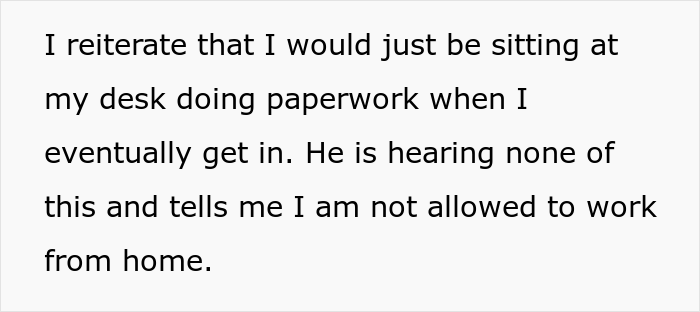
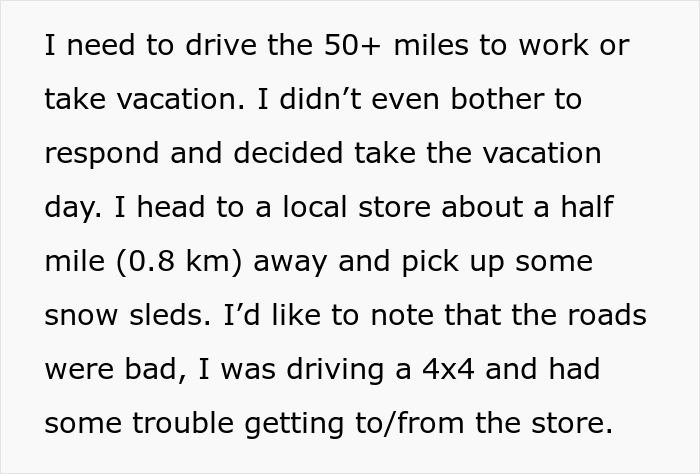

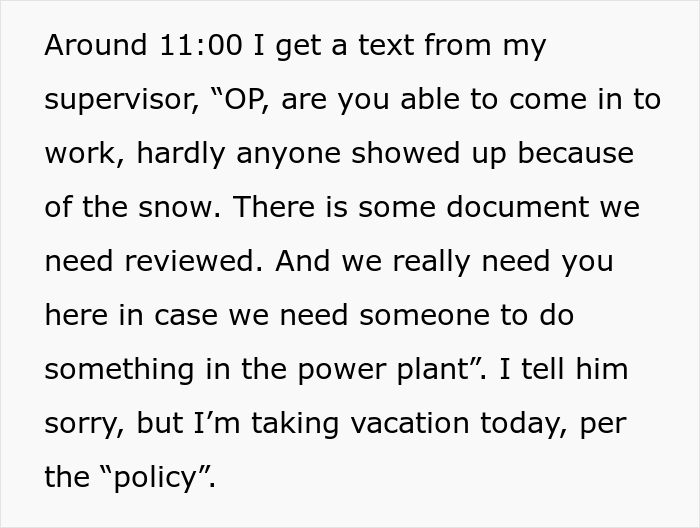

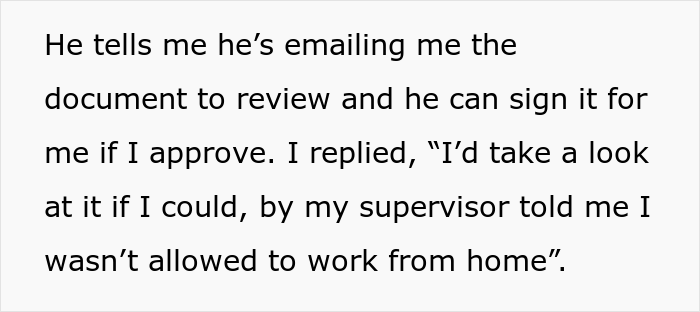

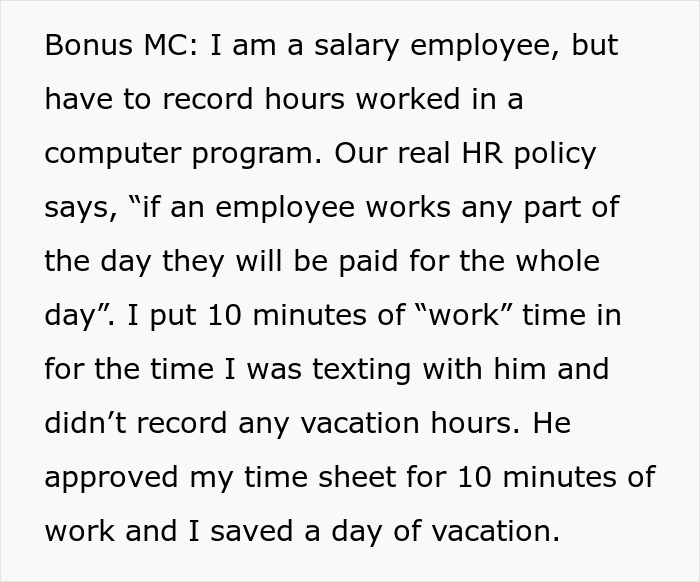
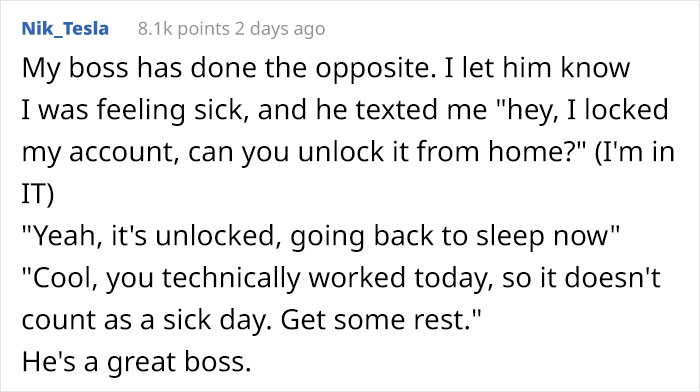

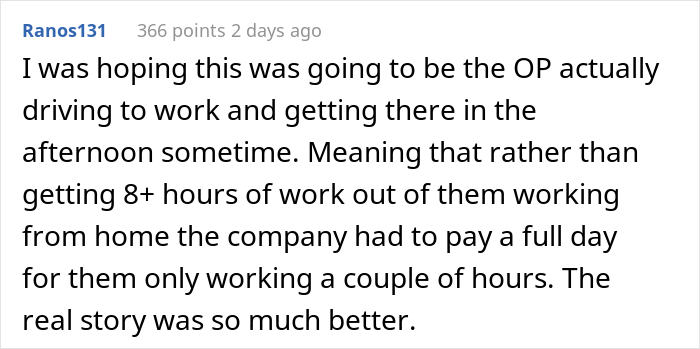
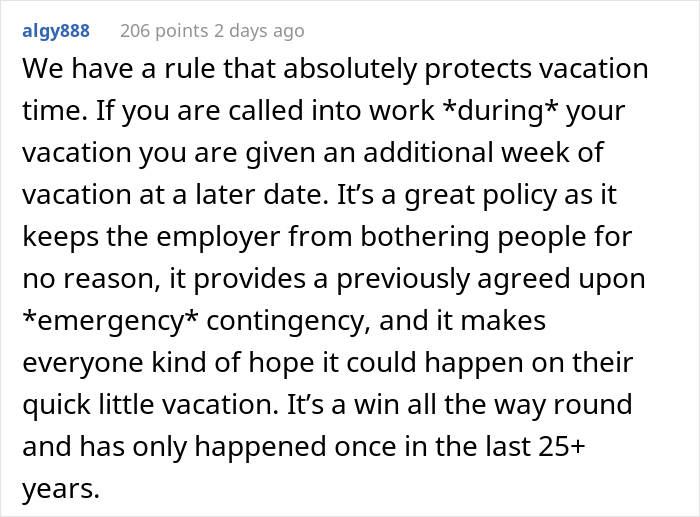
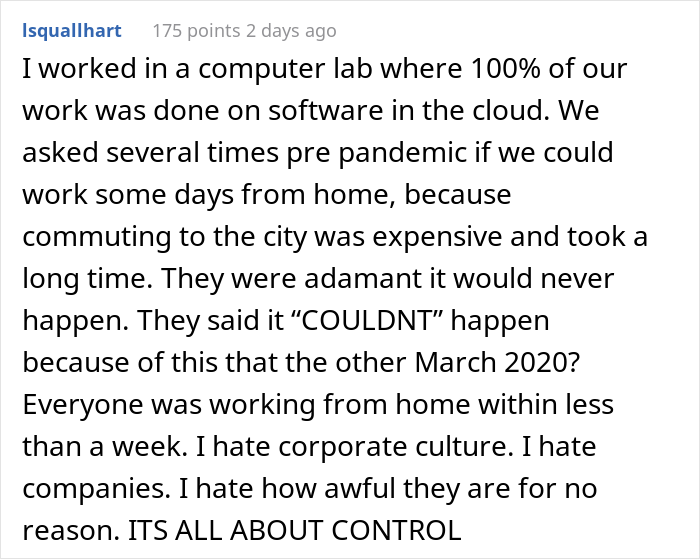
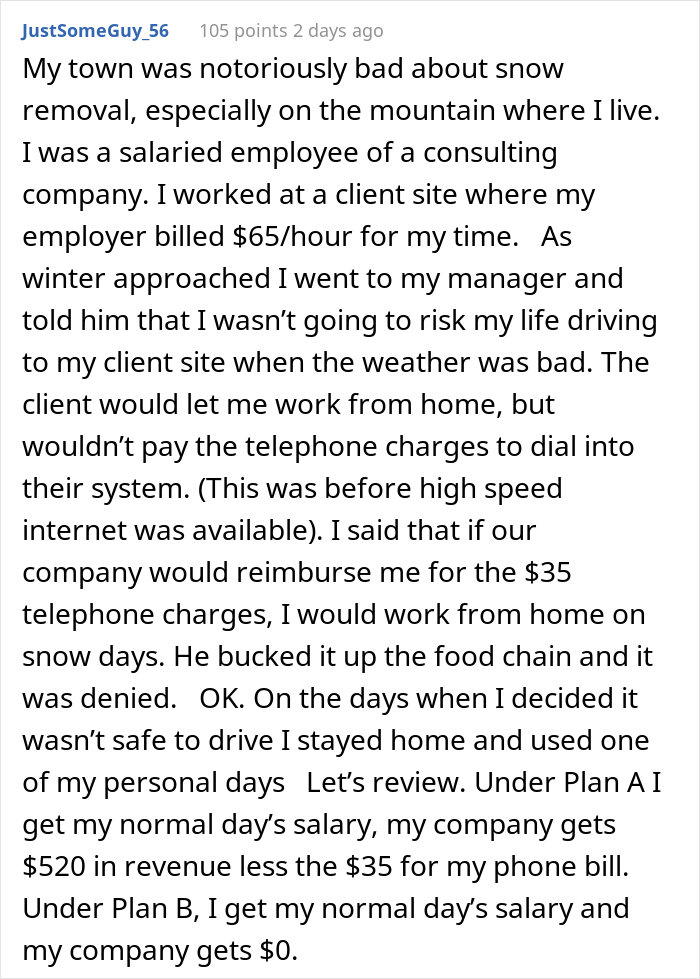

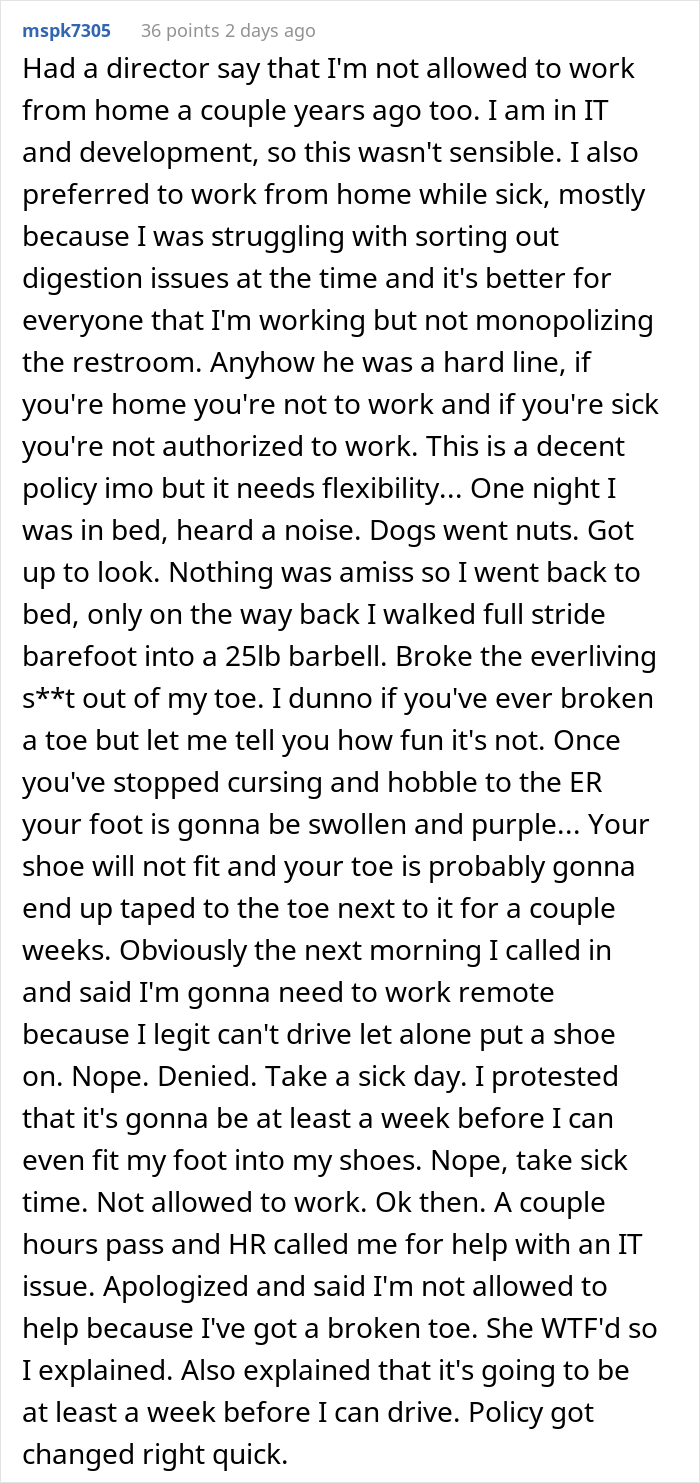





115
39